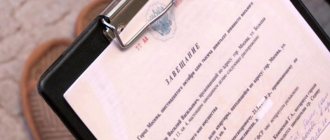Home / Inheritance / When a will is read out after the death of the deceased
Inheritance by will, compared to inheritance by law, has a number of procedural differences that are associated
- Firstly, with the registration procedure;
- Secondly, with the procedure for announcement after the death of the testator.
Both of these procedures are strictly regulated by law - any violation on the part of the testator, notary (or other persons who take part in the procedure), heirs - may become grounds for declaring a testamentary disposition invalid.
You can read about what a will is, what types of wills there are, according to what legal norms and in what order it is drawn up, in the article “How to correctly draw up a will for an inheritance?” This article is devoted exclusively to the procedure for opening and announcing a testamentary disposition to heirs and other interested parties.
How to enter into an inheritance under a will?
If the relatives of the deceased know for sure that he made a will during his lifetime and have the original in hand, they must contact a notary within 6 months after his death and submit an application for entry into the inheritance. If one of the heirs is unable to appear in person, he can send his representative by power of attorney or send a registered letter to the notary.
Before contacting a notary, you need to prepare the following documents:
- Heir's passport.
- Death certificate of the testator (or a court decision declaring him dead or missing).
- Documents of title for inherited property (sale and purchase agreement, donation agreement, extract from the Unified State Register of Real Estate).
- The will itself (certified by a notary).
If relatives do not know whether a will has been drawn up
The testator is not required by law to notify his future heirs that he has made a will in their favor. He also has the right not to inform them about changes made to the will or about its cancellation (clause 2 of Article 1119 of the Civil Code of the Russian Federation). Therefore, sometimes the heirs do not know for sure whether a will was drawn up in their favor, and do not have the original in their hands.
In this case, they have the right to contact any notary office, regardless of their place of residence, the address of the testator or the location of the inherited property, and submit a request to search for a will.
The heirs must substantiate their claim by presenting the death certificate of the testator, their passport and documents proving their relationship with the deceased.
Upon receiving the request, the notary searches for the document in the electronic register of wills. He will find out which notary office holds the original will and whether any changes have been made to it.
However, the notary always refers to the data in this register, even if the original will was with the heirs, since he needs to verify the authenticity of the document.
Is it possible to challenge a will?
In its legal essence, a will is a unilateral transaction. And, like any other transaction, it can be challenged and declared invalid. However, you need to understand that there must be appropriate grounds for this. Here the need to seek professional legal assistance becomes obvious. After all, contestation by heirs is the most complex category of cases among all disputes related to inheritance. This can only be done in court, which requires the party representing your interests to have appropriate knowledge and competencies. It should be taken into account that the opposite side of the conflict is also likely to turn to human rights defenders for help, so not only the fact of providing legal support, but also its quality level is of great importance. By contacting our agency, you receive comprehensive assistance from professional lawyers of the relevant profile with many years of successful practical experience.
How is a will announced?
The moment of opening the will is the date of death of the testator or the date of entry into force of the court decision declaring him dead. But the notary will be able to learn about this fact only from the heirs themselves, who will provide him with the appropriate supporting documents.
After the notary is convinced of the authenticity of the will, he will announce its contents to the heirs indicated in it. Before distributing property among all heirs, the notary determines whether there are applicants for an obligatory share in the inheritance. They have the right to receive part of the deceased's property regardless of whether they were named in the will.
After the inherited property has been distributed among all heirs, the notary will issue each of them with a certificate of right to inheritance.
Grounds for challenge
In order to declare a will void, various grounds can be used. In most cases, this is the inability of the testator at the time of drawing up the document to realize his own actions and understand their meaning. However, the matter is complicated by the fact that the will must be notarized - and one of the notary’s tasks is to verify the citizen’s legal capacity.
In this situation, you can confirm the insanity of the deceased testator in the following ways:
- Post-mortem psychological and psychiatric examination. The key point in its implementation is the analysis of the medical documents of the deceased, including the compilation of a list of his diseases at the time of compilation, the medications taken at that time and the nature of their effect on the body. Based on the results of the examination, a conclusion is made as to whether the testator, at the time of drawing up the will, could not account for his actions due to existing health problems and medications taken.
- Collection of testimony. A survey of citizens who lived together with the testator, his neighbors and other persons who were in close contact with the deceased makes it possible to determine the presence of deviations in his behavior. In particular, if the testator had difficulty navigating the area and did not identify his relatives and friends well. Taken together with the results of a psychological and psychiatric examination, this can be considered as a sign of his incapacity.
- Receiving documents from medical institutions. If the testator was registered at a psychoneurological dispensary and (or) was undergoing treatment for mental illness, then this fact can be regarded as indirect confirmation that when drawing up the will he was not fully aware of his actions.
There are other grounds for challenge. These may be errors in the document that affect the interpretation of its contents, a broken order of its preparation and execution, failure to maintain secrecy, falsification of the signature of the testator or notary. It will also be a violation to draw up a will under the influence of psychological pressure, threats, etc. – such actions violate the principle of freedom of expression.
To determine actual violations that may become grounds for revoking a will, it is necessary to conduct a comprehensive legal examination.
How is a closed will announced?
A closed will is submitted by the testator to the notary in a sealed envelope. Only the testator himself can know about its contents. When handing over a will to a notary, two witnesses must be present, whose signatures are indicated on the envelope.
The heirs do not have the right to open such a will on their own. Its contents are announced only by a notary in the presence of all interested parties and subject to a certain procedure (Article 1126 of the Civil Code of the Russian Federation).
So, after the notary receives confirmation of the testator’s death from the future heirs, he must check the identities of the applicants, establish their family ties with the testator and, within 15 days after their application, set a date for opening the will. The notary must send notice of the date and time to all applicants, as well as heirs at law.
The document is opened in the presence of the specified persons, as well as two witnesses. First, the notary reads out the formal data: about the date and place of opening of the will, about the testator, about witnesses. Then he opens the envelope with the will so that it can be seen by everyone present, and reads out the will of the deceased. If necessary, the notary can explain the contents of the will.
Next, the notary must draw up a protocol for the opening and reading of the closed will, read it to everyone present, sign it, obtain the signatures of two witnesses and enter the relevant data into the register of wills.
The notary makes copies of the protocol and the will itself, certifies them and passes them on to all heirs. The originals of these documents remain with him.
Required documents
Along with the claim, a certain package of documents must be sent to the court:
- copies of the statement of claim in an amount equal to the total number of participants in the proceedings, including third parties;
- a receipt for payment of the state duty, the amount of which is determined by the price of the claim;
- documents confirming the degree of relationship with the testator;
- confirmation of the legitimacy of the claims made by the plaintiff.
In a situation where it is not possible to obtain medical and other supporting documents, the plaintiff, in accordance with Article 57 of the Code of Civil Procedure of the Russian Federation, has the right to send to the court a written petition to compulsorily obtain the required evidence.
Do I have to pay to have a will read out?
To open an envelope with a closed will and read it out, you will have to pay a state fee of 300 rubles. (Article 333.24 of the Tax Code of the Russian Federation). Payment of the fee, as well as expenses for legal and technical services, are borne by the heirs. The tariff depends on the region; all prices can be viewed on the official website of the Federal Notary Chamber. Typically, notary services are paid in the amount of 2,000 - 4,000 rubles. No one is exempt from paying state fees and notary services, even if the heir is the spouse, parent or child of the testator.
Customer Reviews
Thanks to Pavlyuchenko A.V. from Astafieva A.S. I express my gratitude to the Legal Agency and in particular to lawyer Alexander Viktorovich Pavlyuchenko for the work done, high qualifications and high-quality approach. Thanks to Alexander Viktorovich, we managed to achieve a result in court in a case on the protection of consumer rights that I did not even expect. The amount recovered in court even exceeded my expectations. Thank you very much for your qualified work and professionalism.
Sincerely, Astafieva A.S., 03/01/2019
Gratitude from Natalya Gurova I would like to express my gratitude for the qualified and friendly advice from legal practitioner Daria Igorevna Zaprudnaya, Vasily Anatolyevich Kavalyauskas and Daria Valentinovna Kutuzova. The environment at the law firm is welcoming and professional. I wish you continued prosperity. Thank you for your help.
Best regards, Natalia Gurova. 07/06/2018
Thanks to Mavrichev S.V. from Bars Dan A. I thank the wonderful Lawyer Sergei Vyacheslavovich Mavrichev for thorough, competent advice and human mutual assistance to all his clients who are in deep need of qualified and timely legal and psychological advice.
Leopard Dana A. 09/18/2018
Gratitude from Tunnova L. Sergey Vyacheslavovich! Thank you for the qualified advice you provided regarding my question in the field of consumer protection (dispute with TC OPT, the kitchen was not delivered)
Lyubov Tunnova December 12, 2018
Gratitude from Volkova N.E. I express my gratitude to Vasily Anatolyevich for his professional and competent assistance in resolving the issue of protecting my consumer rights. As a result, I received decent compensation from. Thank you!
Volkova N.E. November 30, 2018
Gratitude from gr. Tiuntsova G. A. I asked for advice from your “Legal Agency of St. Petersburg” - regarding deception by one person who presented himself as an employee of Rospotrebnadzor of the Krasnoselsky district, Novichkov A. A. Offered me a service - before the New Year, go on a tourist trade union voucher to Moscow on the Sapsan railway transport. I refused due to the manipulation of the placement of seats - in different trains, and then by car. Lawyer Sergei Vyacheslavovich Mavrichev handled this case and provided consultations. I thank you for such a sensitive and attentive attitude in office work, which was denied at the 58th police department of the Vyborg district, under Art. 24, 144, 145 of the Code of Criminal Procedure of the Russian Federation, I now have the right to appeal the conclusion and will send an application for further investigation to the district prosecutor's office.
Tiuntsov G. A.
8
Gratitude from Komardin I ask you to express my gratitude to lawyer Alexander Viktorovich, who competently and clearly explained to me my further actions to solve the problem that my relatives found themselves in.
02/11/18 Komardin S.I.
Gratitude from Piskunov I.B. I just don’t have words to express my gratitude to Sergei Vyacheslavovich. Thank you for having such a lawyer. Thank you for your help regarding the issue regarding the employment contract.
Piskunov I.B. 12/12/2018
Gratitude from gr. Moskovchuk V.G. I express my deep gratitude to lawyer Denis Yuryevich for the consultation and bringing the case to its logical conclusion. Legal documents were drawn up very competently and sent to court. The case is won. Hooray!!! Thank you very much!
Plaintiff: Moskovchuk V. G.
Thanks to Pavlyuchenko A.V. from Radhuan M. Dear Pavlyuchenko Alexander Viktorovich. Let me express my sincere gratitude for the qualified legal assistance provided. Thanks to your professionalism, I was able to achieve a decision in my favor. I wish you further prosperity and professionalism.
Radhuan Mohamed 06/08/2018
Results
- The contents of the will are announced only after the death of the testator.
- The announcement procedure takes place in accordance with the procedure established by law. Any violation of it may serve as grounds for challenging the will.
- To find out where the envelope with the will is located, you can contact any notary.
- The opening of the envelope with the closed will and the announcement of its contents occurs in the presence of all heirs and witnesses within 15 days after the applicants’ application.
- After the reading of a closed will, the notary is obliged to draw up a protocol.
- Heirs are required to pay a state fee of 300 rubles. for opening the envelope and reading out the closed will.
You can get a free consultation with a lawyer on inheritance matters on our website - write in the feedback form or call the specified contact numbers.
Facebook
Deadlines
Since a will is a one-sided transaction, it can be contested within the same time frame as other transactions. According to Art. 181 of the Civil Code of the Russian Federation, the general period for challenging is 3 years from the moment when the potential heir should have learned or learned about the violation of his right. This point in most cases is the reading of the will by a notary.
This provision may create certain problems. In particular, if the period of appeal established by the Law has been exhausted, and the plaintiff explains this by the fact that he only recently learned about the existence of the will, then the defendant is able to file a counter-statement about the plaintiff missing the statute of limitations for this category of cases.
Validity
It is best for people who expect to receive an inheritance to let the notary know about this as quickly as possible in order to avoid the need to go to court and not waste their own time. But in some situations, the heir, due to certain circumstances, does not have the opportunity to declare his rights or is not at all aware of the death of the testator. What to do then?
- After the will comes into force, the heirs must decide whether they want to become the owner of the inheritance or want to refuse it (Civil Code of the Russian Federation. Article 1157). According to the law, six months are allotted for this action and they begin immediately after the death of the testator (Civil Code of the Russian Federation. Article 1154).
- If there is no active action on the part of the testator, the law provides for a different period of time.
It is valid for 3 whole years and is needed so that the heir can restore his rights with the help of the court if he had good reasons for missing the primary time of inheritance. Moreover, these 3 years do not begin from the date of death of the testator, but begin when the heir lost a circumstance for which he did not apply earlier.
Reference! The will does not provide a framework for the validity period and works indefinitely. If it was lost by relatives or not found at all, you should contact the notary, where its certified copy is usually kept.
Video about the timing of inheritance:
Requirements for a witness to attest to a will
Any type of will can be made in the presence of a witness. In this case, he also signs the testamentary document, which must contain all the information about the witness present. The notary warns the witness about the need to maintain the secrecy of the will and must explain to him the contents of the document drawn up. The capacity of the witness must be certified by a notary. If the witness did not meet the requirements established by law, the will can be challenged by interested parties.
Wills equivalent to notarized wills
Article 1127 of the Civil Code of the Russian Federation establishes rules for documents that are equivalent to notarized wills. These may include:
- a will of a person who is kept in a medical institution, sanatorium, home for the elderly or disabled. Certification of their authenticity is carried out by the heads. doctors or their deputies. They have the right to put their signatures on a document that reflects the will of the testator;
- will of a person sailing on a sea vessel under the flag of the Russian Federation. The captain of the vessel has the right to certify such documents;
- will of a person who is on an expedition. The leaders of the expedition can assure him;
- wills of persons in military service in places where there is no notary. Commanders are authorized to certify the authenticity of such wills for persons undergoing service, as well as members of their families;
- wills drawn up by persons undergoing treatment in a military hospital or sanatorium. Certification of the authenticity of the testator's signature can be carried out by the heads. doctors of such military medical institutions;
- wills of persons held in places of deprivation of liberty. In this case, the will can be certified by the head of the correctional institution.
The list of officials who are granted the right to certify the authenticity of a signature on a testamentary document established by law is exhaustive.
Challenging a will certified by a notary
In judicial practice, cases of challenging a will are quite common, including the authenticity of a signature on a closed will. Courts can recognize the invalidity of such a document on the same grounds as provided for by the Civil Code for invalid transactions. These include:
- content deficiencies;
- inconsistency with the form;
- violation of will;
- defects of the subject composition.
A will can be contested either in its entirety or in a separate part.
Civil legislation assumes that the testator has the right to freely formulate his orders. Therefore, the standard form, as a sample will, is not established by law. You can use your own will template. However, it should be taken into account that there are legal restrictions on the content and form of such a document. Failure to comply with them may result in a will being contested. Therefore, when drawing up and notarizing a will, it is recommended to use the sample proposed by the notary.
Author of the article
Commentary to Art. 1125 Civil Code of the Russian Federation
1. A will that contains an order of only one citizen is subject to notarization. A will containing the will of several citizens is not subject to certification. Notarized wills, depending on the subjects certifying them, can be divided into types: certified by a notary (Article 1125); certified by officials of local government bodies and consular offices of the Russian Federation (clause 7 of article 1125 of the Civil Code, part 4 of article 4, part 1 of article 37 of the Fundamentals of Legislation on Notaries); certified by other persons specified in Art. Art. 1127 and 1128 of the Civil Code (equated to notarized wills). The named types of wills have the same legal force.
2. The testator must write a will in his own hand on paper and has the right to contact a notary with an already prepared will, or he can write it in the presence of a notary. The text of the will can be written from the words of the testator and the notary himself. In practice, this is exactly what happens most often - after all, the testator may make mistakes, express his will unclearly, etc. Thus, notaries have no right to accept for the performance of notarial acts documents that have erasures or additions, crossed out words and other unspecified corrections, as well as documents executed in pencil (Article 45 of the Fundamentals of Legislation on Notaries). At the same time, the notary has no right to refuse to write a will if the testator for some reason cannot or does not want to do it himself. To facilitate the creation of the text of the will, the use of any technical means (computer, typewriter, etc.) is allowed.
3. The text of the will, written down by a notary from the words of the testator, must be read by the testator in the presence of the notary. This must be done before signing it in order to monitor the accuracy of the testator’s will and understand the meaning of the will. In this case, the testator has the right to clarify the essence of certain formulations, the legal consequences of the provisions enshrined in the will, etc. At the same time, the notary makes sure that the testator agrees with the text of the drawn up will and records this circumstance, which may subsequently serve as a guarantee against unfounded claims of interested parties to the notary regarding the contents of such a will.
When the testator cannot personally read the will due to, for example, lack of vision or illiteracy, then the notary is obliged to read out (read aloud) the text of the will. The notary then makes a note on the will that the will was read aloud by the notary, indicating the specific reason why the testator was unable to read the will in person.
It is important to take into account that the responsibility of reading the document out loud rests with the notary even in the case where the will was written by the testator himself. By virtue of Art. 44 of the Fundamentals of Legislation on Notaries, the contents of any notarized transaction must be read aloud to its participants.
4. The procedure for drawing up a will is completed by the citizen’s handwritten signature on the will. The Civil Code does not specify the specific form of the testator’s signature. This issue is reflected in paragraph 41 of the Methodological Recommendations for the certification of wills, acceptance by a notary of a closed will, opening and reading of a closed will dated July 1-2, 2004 (Notarial Bulletin. 2004. N 9). In particular, it is considered advisable for the testator to write on the will, in addition to his own signature, his own name in full by hand, including the surname, first name, and patronymic, unless otherwise follows from the law or national custom.
At the same time, paragraph 3 of Art. 1125 exhaustively names the cases when, at the request of the testator and in his presence, the will can be signed by another citizen (the executor): physical disabilities, serious illness, illiteracy. The fundamentals of the legislation on notaries (Article 44) expand this list by indicating an ordinary (non-severe) illness and other reasons. It is important that these reasons actually constitute an obstacle to the testator signing.
When signing a will, the executor must indicate the specific reason why the testator could not sign the will with his own hand, as well as the complete details of the executor (last name, first name, patronymic, place of residence) in accordance with his identity document.
The persons listed in paragraph 2 of Art. 1124 Civil Code. It is impossible for the executor and the witness present during the drawing up of the will to be the same person, since the witness signs the will together with the testator, and the executor signs the will instead of the witness. Therefore, if a witness is present when drawing up and certifying a will, the will must be signed by two persons: the testator himself (or the executor) and the witness.
In the process of drawing up a will, the executor is obliged to familiarize himself with the text of the will that he signs, and to check the text of the will for compliance with the will of the testator, when the testator cannot do this on his own.
5. In addition to those mentioned in paragraph 3 of the comments. Art. persons, a deaf and (or) dumb and at the same time illiterate citizen can apply to a notary for certification of a will. In this case, the translation (oral or written) of the text of the drawn up will can be made either by a notary, if he speaks the appropriate language, or by a translator (sign language interpreter).
If a deaf-blind citizen applies for certification of a will, his communication with a notary is possible with the help of a sign language interpreter, except in cases where the notary himself has the relevant skills.
6. At the initiative of the testator, a witness may be present during the preparation and certification of the will. In this case, the witness signs the will, and the notary enters his data. The role of the witness is expressed in certifying the authenticity of the will, i.e. confirmation that the person who presented him with the will is the same one who left the will and signed it. The witness must be warned by the notary about the need to maintain the secrecy of the will.
7. Among the mandatory attributes of a notarized will is the obligation of the notary to explain to the testator the contents of Art. 1149 of the Civil Code on the right to an obligatory share in the inheritance and make a corresponding inscription about this on the will.
8. The rules on the form of a will, the procedure for its notarization and the secrecy of a will apply to officials of local government bodies and officials of consular offices of the Russian Federation authorized to perform notarial acts.
New edition of Art. 37 Fundamentals of legislation on notaries (introduced by Federal Law of December 25, 2008 N 280-FZ “On introducing amendments and additions to certain legislative acts of the Russian Federation” // SZ RF. 2008. N 52 (part I). Art. 6236 ) provides that if there is no notary in a settlement or a settlement located on an intersettlement territory, respectively, the head of the local administration of the settlement and a specially authorized official of the local government of the settlement or the head of the local administration of a municipal district and a specially authorized official of the local government of the municipal district have the right to certify wills. At the subordinate level, these relations are regulated by Order of the Ministry of Justice of the Russian Federation of December 27, 2007 N 256 “On approval of the Instructions on the procedure for performing notarial actions by the heads of local administrations of settlements and municipal districts and specially authorized officials of local self-government of settlements and municipal districts.”
Officials of consular offices of the Russian Federation certify wills on the territory of other states. The execution of a will by named persons is regulated by Chapter. XII Consular Charter of the USSR (Vedomosti USSR. 1976. N 27. Art. 404).




